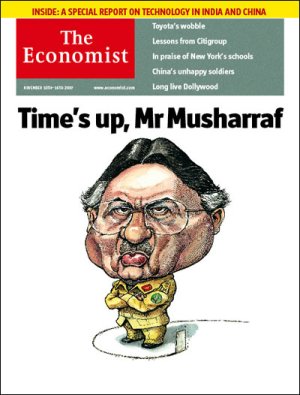The Economist es un bicho raro. Una revista cuyo principal gancho de interés es la economía, pero que hay que leer aunque tu interés no resida especialmente en los asuntos económicos. Una revista británica, pero que vende más ejemplares en EEUU que en el Reino Unido. Una revista fundada en 1843, pero que se ha adaptado a la era de Internet mucho mejor que publicaciones más jóvenes. Una revista liberal, pero que apoyó a Kerry, y no a Bush en el 2004.
En definitiva, un revista que se llama a sí misma "periódico".
Su director, John Micklethwait, explica en una entrevista algunas de las claves del éxito de la publicación y detalles de su funcionamiento interno, incluidas las inevitables referencias a esa vieja costumbre de no firmar los artículos con los nombres de sus autores.
In the past decade the magazine has made a lot of strides in the U.S. market, to the point where The Economist is read by four times as many people here as in the U.K. Does that change how you position the magazine?
No, because I don't think you should pander to your readers. If The Economist started catering to an American view of things, we would lose our readers elsewhere. Often what happens is that in America we get depicted as pro-European, and in Europe we get depicted as pro-American. But once you start thinking too much about who's reading you where -- particularly when you have so many readers in as many places as we do -- you could get yourself into a horrific muddle. We always respect our readers from everywhere, but you cannot design your package around them.
El cliente no siempre tiene la razón. El lector, tampoco.

Comentarios
<% if(canWriteComments) { %> <% } %>Comentarios:
<% if(_.allKeys(comments).length > 0) { %> <% _.each(comments, function(comment) { %>-
<% if(comment.user.image) { %>
![<%= comment.user.username %>]() <% } else { %>
<%= comment.user.firstLetter %>
<% } %>
<% } else { %>
<%= comment.user.firstLetter %>
<% } %>
<%= comment.user.username %>
<%= comment.published %>
<%= comment.dateTime %>
<%= comment.text %>
Responder
<% if(_.allKeys(comment.children.models).length > 0) { %>
<% }); %>
<% } else { %>
- No hay comentarios para esta noticia.
<% } %>
Mostrar más comentarios<% _.each(comment.children.models, function(children) { %> <% children = children.toJSON() %>-
<% if(children.user.image) { %>
![<%= children.user.username %>]() <% } else { %>
<%= children.user.firstLetter %>
<% } %>
<% } else { %>
<%= children.user.firstLetter %>
<% } %>
<% if(children.parent.id != comment.id) { %>
en respuesta a <%= children.parent.username %>
<% } %>
<%= children.user.username %>
<%= children.published %>
<%= children.dateTime %>
<%= children.text %>
Responder
<% }); %>
<% } %> <% if(canWriteComments) { %> <% } %>